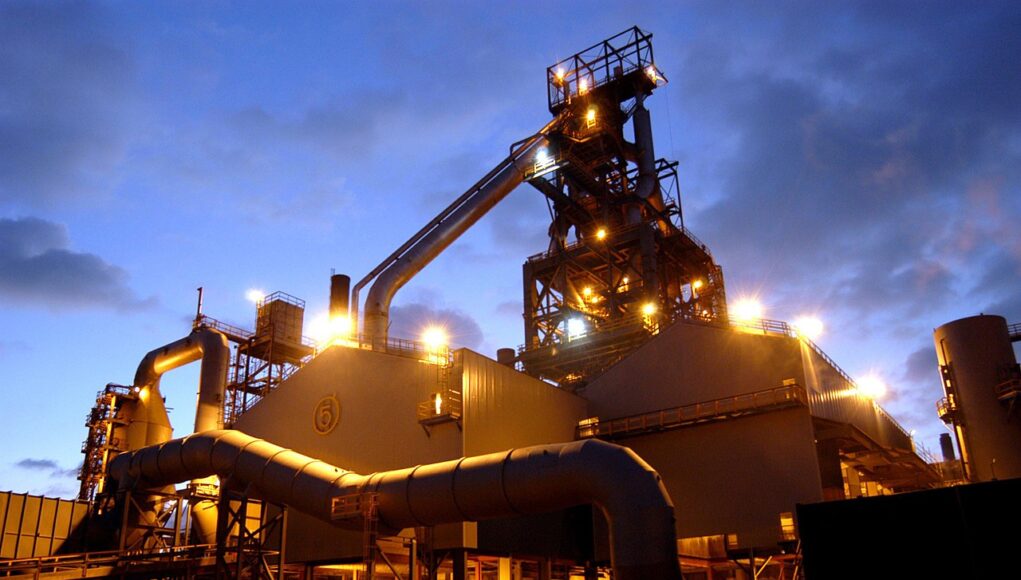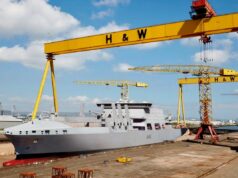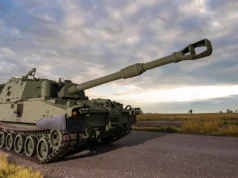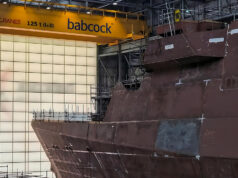During Defence Questions in Parliament today, Richard Tice, Reform Party MP for Boston and Skegness, challenged the Ministry of Defence’s reliance on foreign steel suppliers, urging the Government to prioritise British manufacturers such as Tata Steel and British Steel in defence procurement.
Tice said, “I was astonished to be told by the Department for Business and Trade before Christmas that neither Tata Steel nor British Steel was a critical supplier of the Ministry of Defence. Will the Secretary of State give a commitment that, unlike the previous Conservative Government, this Labour Government will buy British, including British Steel?”
Defence Secretary John Healey acknowledged the historical neglect of the UK steel industry under previous administrations, describing it as a “long-standing, deep-running weakness.”
He added, “A procurement policy under the last Government did not recognise the UK steel industry as a strategic industry and was content for the amount of UK steel sourced for some new ships to be in the single figures.”
Healey pointed to past procurement figures, noting that “under previous procurement Ministers, the proportion was 4%.” He pledged to reverse this trend, promising that the upcoming Strategic Defence Review (SDR) would include a plan to prioritise UK steel in defence projects.
The Government’s stated intention to support British steel aligns with broader goals to strengthen the UK economy while boosting national security. By incorporating a domestic-first approach, the Labour Government signals a departure from past procurement practices that often overlooked the strategic importance of UK manufacturing in defence.
Tice’s intervention highlights growing calls for defence procurement to play a central role in revitalising key industries such as steel, particularly amid global economic uncertainty and heightened security demands.
The response from Healey suggests that the Government is aware of these concerns and intends to address them through more strategic procurement policies.
Previously, we reported that the UK government had reaffirmed the critical role that the domestic steel industry plays in national defence, but noted that it does not have a specific target for increasing the use of UK-sourced steel.
This was confirmed in response to a question posed by James Cartlidge, Conservative MP for South Suffolk, who inquired about the Ministry of Defence’s strategy regarding the use of UK steel in defence programmes.
Responding to the question, Luke Pollard, the Armed Forces Minister, mentioned that the UK steel industry is a vital asset for both national security and the economy. He explained that, while steel for defence programmes is sourced from both UK and international suppliers, some specialised steel required for defence projects may not be available domestically.
“The UK steel industry is an important strategic national asset, vital for our security and our economy. Steel used in our major Defence programmes is sourced by our prime contractors from a range of UK and international suppliers, as Defence programmes may often have requirements for specialist steel which cannot be sourced in the UK,” Pollard stated.
In addition to sourcing steel, Pollard highlighted efforts by the government to provide greater transparency in the future requirements for steel in defence contracts, allowing UK manufacturers to better plan and bid for opportunities.
He reiterated that as part of the ongoing Strategic Defence Review, the government remains committed to ensuring a resilient and robust defence industrial base, which includes maintaining strong supply chains for steel across the UK. He added:
“As part of the Strategic Defence Review, this Government is committed to developing a defence industrial base that is able to better support our own and allies’ security while also helping to drive economic growth. We will ensure a strong defence sector and resilient supply chains, including steel, across the whole of the UK.”














Interesting. I thought the last gov argument was that uk steel didn’t not produce the right type of steel for ship armour. Either the gov is planning to fix that gap or someone is lying.
Or they are going to do the polictical scam of increasing it from 4% to 4.5% and say look we fixed it.
We don’t put steel armour on ships these days and haven’t for decades, there are composite protective sheets (Kevlar etc) but not steel.
Always seems strange to me that no one in politics or the media seems to ask if we use British sourced Kevlar or plastic or aluminium or wood in our ships but there is this obsession with Iron Alloy like it’s the 19th century.
They focus on steel because everyone knows what steel is most don’t know about composite armour, it’s largely about looking good. Steel is also far more wide reaching than most other materials, you can build a warship or tank without wood or plastic (perhaps with compromises) but you will struggle without steel.
If you bothered to read the article you’d see Luke Pollard, the Armed Forces Minister, said that in some cases specialised steel not manufactured in the U.K. was required.
The last goverment said all steel that could be produced in the uk was being sourced there and the reason for the low amount was because it wasn’t available. Yes I did read the article doesn’t change that someone is lying.
We don’t have any armour on ships,
I saw that Plassan have a contract to deliver armour for the the Type 26. Also special compartments, such as magazines and silos need armour to ensure they don’t blow up as easily if the ship is hit. Not just on large warships either. One of the differences between the B2 Rivers and the Amazonas that was used to explain the price differences was magazine protection.
We don’t have huge chunks of visually obvious compound armour all around the hull like the old dreadnoughts, but that doesn’t mean we don’t use armour.
How much steel does this clown think the U.K. MOD uses annually. Not enough to keep a blast furnace and thousands of jobs going.
Making defence products more expensive isn’t ideal either.
The problem is unless steel can be made cheaper inside the U.K. than it is to make it outside the U.K. and ship it here it’s a losing battle. Now the U.K. does do better with specialist metals as opposed to bog standard steel production
You need to do some research! we no longer even have the capability to produce steel for the pressure hulls for our subs. We import it from France.
I am sure we can get some really cheap steel from China, which HM Treasury would be be happy with but I think many people can see the flaw in this approach.
U.K. politicians talk a good match about local suppliers, sovereign capability, strategic industries and industrial plans but until a politician breaks the power of the Treasury we will be stuck with the ‘Bean counters’ logic that simply wants the lowest bid.
https://hansard.parliament.uk/lords/2021-11-30/debates/5B44640E-9B3E-4547-8680-DFD780AAF554/ShipbuildingUseOfBritishSteelForRoyalNavy
The purpose of the European coal and steel union (forerunner to the EEC) was to ensure France and Germany (plus a bit in Benelux) had a permanent hegemony of Western European heavy industry. There was never any space for other member states or later entrants to retain this capability, just to be a captive consumer of these protected producers.
Tice doesn’t care, this is just a political points scoring exercise for him and a sop to the rabid xenophobes in his party.
I have personally not voted Reform but he did at least ask the question and this is hardly an issue that attracts much msm attention so I will commend him for at least doing that. Some good work has also been done with Sheffield Forgemasters but we are way behind other European countries in protecting key industries.
I am afraid the neo liberal Tory and Labour parties focus on net zero and free markets all whilst following Treasury guidance means we will continue to be at a strategic disadvantage in protecting core industries or companies from subsidised foreign competition and takeovers.
I believe you touched the issue with the word “clown”
That’s all he is, 😀
perhaps but does it matter if British steel is 20% more expnsive? I dont think so if you take into account most of the cash comes back to the Country in tax NI and then cash spent in the economy rather than another countries economy
Every GMPP programme i.e. any defence programme of note, has specifically to report on usage of UK steel in its reporting. Where it is possible they have to use British steel….problem is we don’t make all grades…
perhaps but does it matter if British steel is 20% more expnsive? I dont think so if you take into account most of the cash comes back to the Country in tax NI and then cash spent in the economy rather than another countries economy
If the US and France both make steel how can it not be viable for the UK?
The main cost driver is likely to be the fact that steel production is very energy intensive, and we have a government that doesn’t think the cost of energy is an important issue for our economy. Apparently meeting emissions targets is ever so important but security, availability and affordability of supply is not.
It’s too late now, most of our steel industry is long gone, it would cost astronomical money to reestablish it, money that no business is going to invest.
The UK has high labour costs, high energy costs, no cheap extractable coal and very little iron ore left. It has almost no heavy industry and we don’t use steel in construction.
It’s always amazed me that anyone would even think the UK should have a steel industry. It’s amazing we still have what we have.
I didn’t realise we no longer use steel in construction.
I have worked in construction for almost 40 years at a Senior level and we use as much steel now as we did when I started. Do you know the difference between hot and cold rolled ? Please don’t make statements that are blatantly not true.
Btw you do make some good contributions on here so don’t spoil it.
There has been a lot of talk recently about the loss of the coking furnaces at Port Talbot meaning that we can no longer produce pig iron. However, I read somewhere recently that someone has managed to produce pig iron from iron ore using some sort of electric furnace. The article didn’t give any details as the process was commercially sensitive, but if true then coal for steel making could become a thing of the past and it might mean that Port Talbot could once again produce pig iron if the technology proves viable.
Either way there is a lot of scrap metal out there and its value is likely to start to rise. Some have even pointed out that our old land fills are treasure troves of raw materials and are likely to become even more valuable as time moves on. Challenges exist, of course, methane being an obvious one.
Great change brings great opportunity.
Interesting times.
Cheers CR
A combination of electric arc and hydrogen. Tata have been testing this in IJmuiden works. However I was told by someone connected to Port Talbot, that it was a non-starter in the UK due to a lack of a pipe net work for the hydrogen
Hi @Simon
The BOC plant in Port Talbot has a hydrogen production facility specifically to supply the steel works through a pipe network.
“BOC Gases has a major industrial site at Margam in Port Talbot, including SMR hydrogen production for pipeline
supply to Tata Steel.”
https://www.gov.wales/sites/default/files/consultations/2021-01/baselining-report-hydrogen-development-in-wales.pdf
Just found a Patent on Google Patents (just found Google Patents as well 🙂 ) for a new method of producing pig iron in an electric furnace, so stuff is looked at…
Cheers CR
Go on Richard tell them what they don’t like to hear 👍 🇬🇧
Like his comment the other week that the rich in the UK pay too much tax ?
Ignorance is no reason to show the flag here, better brexit loving, russian funded, Musk supported parties stay quite. Garage and his right-wing ilk have betrayed this country enough. O and the Tories manage to underinvestment in the trillions over 14 years. The Labour government of Blair managed 14 years of growth. All perfectly checkable. The right care only about their wealth, nothing but parasites.